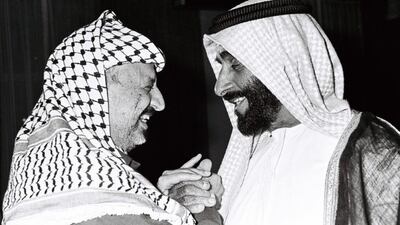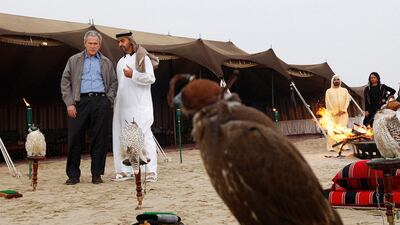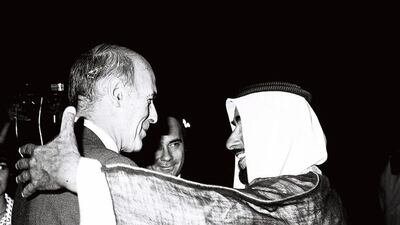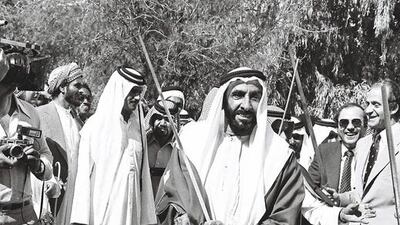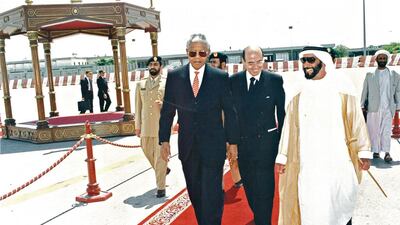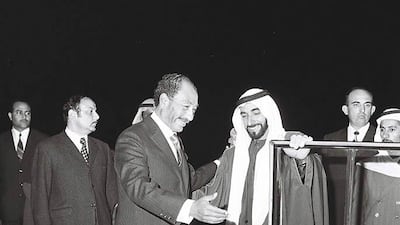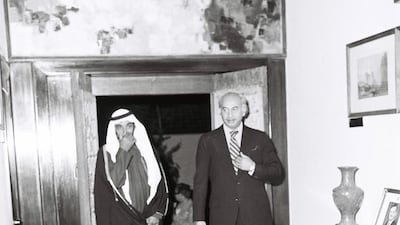It is one of the duties of a head of state to welcome foreign dignitaries and leaders, and, in turn, to return those visits overseas.
From the early days of the UAE and even before, these state occasions were crucial to establishing the emerging country’s place in the world, forging ties that could bring peace and security, not just at home, but for all mankind.
For Sheikh Zayed, as the Ruler of Abu Dhabi, this was a process that began well before unification in December 1971 and continues to this day with Sheikh Khalifa bin Zayed, the current President; Sheikh Mohammed bin Rashid, Vice President and Ruler of Dubai; and Sheikh Mohammed bin Zayed, Crown Prince of Abu Dhabi and Deputy Supreme Commander of the UAE Armed Forces.
DIPLOMACY THROUGH THE AGES
1971: December 9 sees the UAE given membership to the United Nations. Among the first 14 nations to recognise the UAE are the United States, Egypt and Japan. Three days earlier, the UAE was also admitted to the Arab League.
1972: The United States Embassy opens in Abu Dhabi. New UAE embassies are announced for Paris, Rabat and Tokyo.
1973: Following US support for Israel in the October War, Sheikh Zayed annouces an oil embargo with other Arab oil-producing countries.
1974: Sheikh Zayed pays a state visit to Pakistan and then, later in the year, to India, signing a cultural agreement with the prime minister, Indira Gandhi.
1977: Saif bin Ghubash, the Minister of State for Foreign Affairs, is shot dead at Abu Dhabi International Airport while meeting Syria's foreign minister, the intended target.
1979: Queen Elizabeth visits Abu Dhabi and Dubai on the royal yacht Britannia, offically opening Jebel Ali Port and the World Trade Centre, then the tallest building in the Middle East.
1981: At the InterContinental Hotel, Abu Dhabi hosts a meeting of six Gulf states – the UAE, Saudi Arabia, Kuwait, Bahrain, Oman and Qatar – to form the Gulf Cooperation Council.
1984: The UAE ambassador to France, Khalifa Ahmed Abdulaziz Al Mubarak, is shot dead by an unknown assailant.
1985: The UAE is elected to a
non-permanent membership of the UN Security Council.
1986: Following a request from the UAE, the United Nations votes to allow the Palestine Liberation Organisation to take part in debate condemning Israel's actions in seizing a Libyan passenger aircraft.
1988: After eight years of war, Iran and Iraq accept a UN Security Council resolution to end the conflict. As a non-permanent member, the UAE sends notes of satisfaction to both countries.
1989: Sheikh Zayed recieves Britain's Prince Charles and Diana, Princess of Wales, on a visit to the Arabian Gulf that includes Abu Dhabi, Al Ain and Dubai.
1991: Following the invasion of Kuwait by Saddam Hussein, the UAE joins an international military coalition for Operation Desert Storm that drives out Iraq's armed forces.
1993: UAE troops return home safely from Somalia after taking part in a joint UN peacekeeping operation to prevent a humanitarian disaster caused by civil war.
1995: Nelson Mandela, now president of South Africa following the end of apartheid the previous year, is welcomed to Abu Dhabi by Sheikh Zayed and Sheikh Khalifa, then Crown Prince of Abu Dhabi.
1999: UAE Armed Forces deploy in Europe for the first time in Operation White Hands, providing humanitarian aid for the people of war-torn Kosovo.
2000: Sheikha Fatima bint Mubarak, the wife of Sheikh Zayed, announces the formation of a fund for refugee women with an initial donation of Dh2 million.
2001: Following the attacks of September 11 on the United States, the UAE severs relations with Afghanistan's Taliban government.
2003: UAE troops deploy in Afghanistan for the first time as part of a continuing mission to provide aid and support reconstruction.
2007: France and UAE sign an agreement to build and open the Louvre Abu Dhabi as the first museum in the Saadiyat Cultural District.
2008: President George W Bush visits the UAE, addressing an audience at the Emirates Palace and enjoying traditional desert hospitality
complete with tents and falcons.
2010: Queen Elizabeth makes her second state visit to the UAE.
2013: Sheikh Khalifa bin Zayed pays a three-day state visit to the United Kingdom, the fourth time Queen Elizabeth has officially met a UAE President in her 62-year reign.
2015: Narendra Modi, the prime minister of India, pays a state visit to the UAE, greeted by huge crowds from the Indian diaspora.
